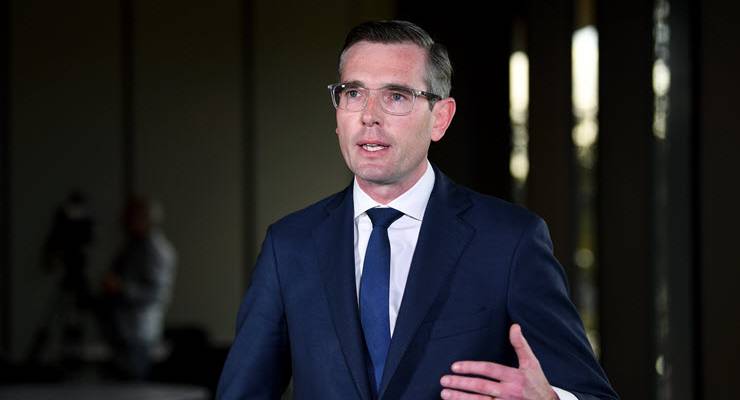
Thanks to some highly-skilled reporting and the compulsion powers of a parliamentary committee, we finally have some idea of what’s been going on in a dark corner of the NSW government.
The state’s multi-billion dollar workers’ compensation scheme, icare, is a government agency that operates under the supposed oversight of the NSW treasury.
But its behaviour has been more akin to a big-end-of-town insurer, and the scandal has just claimed its first government scalp.
NSW Treasurer Dominic Perrottet’s chief of staff Nigel Freitas resigned last night over the “administrative error” that had ministerial staff paid for by the agency.
On Monday icare CEO John Nagle and four other senior officials were grilled in parliament over poor governance and conflict of interest issues.
It followed a joint investigation by The Age, The Sydney Morning Herald and ABC’s Four Corners that uncovered alleged mismanagement and the underpayment of as many as 52,000 injured workers.
Nagle resigned after the grilling, in which it emerged he had failed to properly declare his wife, who was at one point employed by icare, had been given a contract with the agency. He said he had “no idea” of the value of the contract, and couldn’t even recall his own salary.
As far as corporate scandals go, it’s a classic of the genre. But how did it happen inside a government enterprise and how do we stop it from happening elsewhere?
Worst of both worlds
Greens MP and committee member David Shoebridge says the problem is much bigger than icare. Government agencies around the country have for decades been under pressure to perform like their private sector counterparts. That’s resulted in inevitable conflicts of interest and a failure of accountability.
“What we’ve seen with icare is the worst of both worlds,” Shoebridge says.
“High executive pay and bonus structures, typical of parts of the private sector. And job security and invulnerability that can be a feature of the public sector.”
Icare was set up by Perrottet in 2015 when he was finance minister. It was supposed to transform the state insurer into a lean, mean enterprise with a corporate can-do attitude. But Professor Alex Collie, director of the insurance work and health research group at Monash University, said this model — now typical of almost all workers comp schemes — has allowed conflicts to flourish.
“What this shows is the way in which we design our workers compensation system is fundamentally flawed,” he said. “We run them as insurance schemes when what they’re trying to deal with is a health issue.”
Question of accountability
At a time when federal, state and territory governments are under even more pressure to turn agencies into publicly-bankrolled businesses, the icare scandal raises serious questions about the accountability of government agencies to their departments.
Perrottet has defended the icare board, saying it should be congratulated for the work it had done since it was established in 2015. That praise has been absent since Tuesday when it was revealed he had known about the conflict of interest involving Nagle’s wife for 18 months.
So who is accountable here?
“Ultimately it’s the government and the treasurer,” Unions NSW secretary Mark Morey said. “It’s his board, his organisation that he set up. And it’s a failure of oversight within government.”
Morey said the first thing that needs to change is how government boards are appointed.
“Otherwise you get not a culture of independence, but a culture of coverup.”








A still run for and by alcoholic political mates….. Why isn’t Eddie Obeid in there?
“Friday F*****s”?
How many times am I going to be made to log in (after I’ve been allowed to write a comment) before I get a comment up?
And then have to log in again later to comment further?
So . . . . . . frustrating!
I agree. Can’t edit either. I don’t know who they’ve got managing their site, but it’s not state of the art best practise…
Next? Scotty From Marketing’s stacked “National Covid-19 Commission” deck?
Yet another bullseye from ABC Four Corners and the former Fairfax papers.
They “probably” just beat Limited News to it?
Perrotet, a person drenched and riddled in self inflating superstitious idiocy, has always been an ambitious careerist prepared to do anything anytime to anyone or anything for any personal gain, glory, grab or gamble for a gutful. He has disappointed, done wrong, broken “law” depending on the juggling and involved persons, has brazenly bluffed and puffed and may finally claim some “bad luck”or unfortunate “error”, probably by someone expendable. The scraps, scrapings, scum, scamminess of Perrotet is typical enough conservative tromping through life’s weedy paddocks.
Perottet is a real problem, a neoliberal acolyte, an unthinking ideologue, and somehow the next best thing for Premier in NSW. This is what the LNP serves up under its apprenticeship model, it’s a race to the bottom with Labor only seeming to be able to get crooks through their apprenticeship model. We are in the worst of all possible worlds, Augustine had no idea.
“It was supposed to transform the state insurer into a lean, mean enterprise with a corporate can-do attitude“
It always is supposed to do that, and it never does. And if it is fully outsourced to the private sector it is even worse, like aged care. There is an elephants graveyard full of these spiv factories.
Of course, the line about private sector jobs not being invulnerable is also a myth. Look at the scandals of the last 20 years in the private sector and you will find one scapegoat loses his job, or 2 at worst, for crushingly poor, sysdtemic and cultural debacles, banks, insurance, who lost their job at Rio Tinto for blowing up the earliest site of human history on the planet? Still waiting.
I hope this debacle runs, and takes Perrottet down, he has many more neoliberal mistakes he wants to foist upon us.
“Típota Pero-debt”? …. It’s all Greek to me.